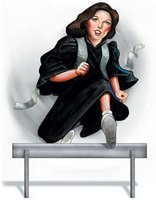Women in Ministry
A final concern raised by some when I made known my intent to attend a Baptist seminary was the question of women in church leadership. The concern stated was that Southern Baptists do not permit women to serve as pastors. This is an issue that has, indeed, been very controversial in the last century; the picture to the left comes from the
magazine of a liberal mainline denomination that has grappled with this issue and settled on the side of embracing female pastors.
In Fredericton, I knew many who felt the same way. These people felt I should not attend a Southern Baptist seminary because their attitude towards women was wrong. One person, in fact, told me when I mentioned my decision, "You must hate women."
Yes, that's the level that theological dialogue and debate has descended to in the modern church.
So, first, I'll state categorically, as a happily married husband and as a Christian man, that I do NOT hate women. I believe God created man and woman in his image, not just man:
So God created man in his own image, in the image of God he created him; male and female he created them. (
Genesis 1:27)
And in Christ, there is no male or female (
Galatians 3:28). Christian women are equal in the eyes of God to Christian men - they are just as valuable.
Now, the issue of gender and church leadership must first be rooted in a Biblical construct of church leadership. The New Testament describes three offices of the church: apostle, elder/pastor/bishop, and deacon. Apostles passed away with the death of John at the end of the first century, as one of the qualifications of the apostolic office was to have seen Christ in the flesh (
1 Corinthians 9:1, 15:7-9), and so there are no "apostles" in the New Testament sense today. (This does not mean that certain apostolic
functions, such as of beginning new works and coordinating the efforts of different churches, no longer exists - only that the infallible authority of the original apostles does not reside in any church office today). The terms elders, pastors, and bishops are used interchangeably in the New Testament and early patristic writings, and refer to the same office. They are the spiritual leaders and shepherds of the church. Deacons are those who are appointed by the church to minister to physical needs - the term
diakonos in Greek means, literally, "servant."
Now, can women serve in these roles? Let's look at Paul's instructions about elders first:
The saying is trustworthy: If anyone aspires to the office of overseer, he desires a noble task. Therefore an overseer must be above reproach, the husband of one wife, sober-minded, self-controlled, respectable, hospitable, able to teach, not a drunkard, not violent but gentle, not quarrelsome, not a lover of money. (
1 Timothy 3:1-3)
This is why I left you in Crete, so that you might put what remained into order, and appoint elders in every town as I directed you-- if anyone is above reproach, the husband of one wife, and his children are believers and not open to the charge of debauchery or insubordination. For an overseer, as God's steward, must be above reproach. He must not be arrogant or quick-tempered or a drunkard or violent or greedy for gain, but hospitable, a lover of good, self-controlled, upright, holy, and disciplined. He must hold firm to the trustworthy word as taught, so that he may be able to give instruction in sound doctrine and also to rebuke those who contradict it. (
Titus 1:5-9)
Note that Paul presupposes in his comments that the elders are men - "husband of one wife." More importantly, they must be "able to teach" and "give instruction." This is integral to the role of an elder. Particularly important with regards to this issue is this statement Paul made just a few verses before the qualifications found in Timothy:
Let a woman learn quietly with all submissiveness. I do not permit a woman to teach or to exercise authority over a man; rather, she is to remain quiet. (
1 Timothy 2:11-12)
If women are not permitted to teach men, and the ability to teach and rebuke is integral to the office of elder, it logically follows that women are precluded from such roles.
Notice furthermore that the teaching requirement is not repeated for deacons. The diaconate is not a teaching body:
Deacons likewise must be dignified, not double-tongued, not addicted to much wine, not greedy for dishonest gain. They must hold the mystery of the faith with a clear conscience. And let them also be tested first; then let them serve as deacons if they prove themselves blameless. Their wives likewise must be dignified, not slanderers, but sober-minded, faithful in all things. Let deacons each be the husband of one wife, managing their children and their own households well. (
1 Timothy 3:8-12)
So, although Paul presupposes men as deacons here as well, the deacons do not hold a teaching or authority role. Furthermore, Paul demands that the deacons' wives must meet the same standards - a requirement not expressly stated for elders. It is as if he expected husband-and-wife teams to cooperate in such service. If so, we would expect the New Testament to refer to female deacons - and, actually, there is such a reference:
I commend to you our sister Phoebe, a deaconness of the church at Cenchreae... (
Romans 16:1, Revised Standard Version)
Most contemporary versions render Phoebe's description as "servant," but as stated above, the Greek for servant is the same as for deacon - hence my choice of the RSV.
So, in short, women may not serve churches in positions of teaching or other authority over men. This is stated repeatedly by Paul:
Let a woman learn quietly with all submissiveness. I do not permit a woman to teach or to exercise authority over a man; rather, she is to remain quiet. (
1 Timothy 2:11-12)
As in all the churches of the saints, the women should keep silent in the churches. For they are not permitted to speak, but should be in submission, as the Law also says. If there is anything they desire to learn, let them ask their husbands at home. For it is shameful for a woman to speak in church. (
1 Corinthians 14:33-35)
This precludes women from being pastors, or elders, or bishops in the church. Also forbidden, then, is the curious role - increasingly seen in charismatic and non-denominational churches - of women as "co-pastor" alongside their husbands.
Womens' submission is not, as is argued by some, simply an effect of the Fall and thus voided by salvation in Christ. This argument is based on a reading of Galatians 3:28 that ignores its context - it speaks of equality in salvation, not equality of function or the end of physical distinctions. Rather, Paul stresses that the functional differences between men and women - and a woman's submissiveness - are, in fact, God's design and rooted in creation itself, prior to the Fall:
Let a woman learn quietly with all submissiveness. I do not permit a woman to teach or to exercise authority over a man; rather, she is to remain quiet. For Adam was formed first, then Eve... (
1 Timothy 2:11-13)
Furthermore, the submission of women to their husbands and in church life is NOT simply a peculiar feature of the first-century context. I have heard many people argue that Paul's instructions addressed a particular situation in a particular historical and geographical context, and thus is not normative today. This view is wrong - not only does it sound eerily similar to liberal arguments against the Bible's prohibitions of homosexuality, but as observed above, the distinction and function of men and women is rooted in Creation itself. It has been applicable ever since. Finally, Paul repeated his commands about women in submission not to just one church, but to churches in Corinth, Ephesus, and Colossae, to Timothy and to Titus, and even Peter affirmed the doctrine in his letter! To explain away Scripture's commands about the function of women in the church and household is to do tremendous damage to the authority of Scripture, and opens the door for practically any other doctrine to be similarly "contextualized" and ignored.
Now, does this mean women cannot serve in ministry? Not at all!
First, as stated above, I see no Scriptural reason why women cannot serve as deaconesses. Now, many Baptist churches, for instance, use the deacons as a ruling body and invest them with authority and teaching responsibility. If this is the case, these "deacons" are closer to elders in their responsibilities, and such a church would be precluded from allowing women to serve as "deacons." But in churches that recognize the Scriptural qualifications for deacons and use them accordingly, without teaching or ruling authority, women can (and should!) be called as deacons.
Second, Paul tells Titus - and us - that one of the responsibilities of older women is to teach and shape the younger women of the church:
Older women likewise are to be reverent in behavior, not slanderers or slaves to much wine. They are to teach what is good, and so train the young women to love their husbands and children, to be self-controlled, pure, working at home, kind, and submissive to their own husbands, that the word of God may not be reviled. (
Titus 2:3-5)
Therefore, there is certainly a Scriptural mandate for women to serve in positions of authority over other women - as, say, women's ministers. Such a position would not be an elder's or pastor's position - for that would entail authority over the church in general and men in particular. Rather, it would be a particular service to the church, and could be described as a deaconness' role.
Third, there is no Scriptural prohibition of women serving as children's ministers - again, as a particular type of deaconness. Remember that the spiritual development of children is first and foremost a family matter, not a church responsibility - and so is ultimately something God will hold their parents, and particularly their fathers, accountable for. Any church activities like childrens' Sunday School or Vacation Bible School could certainly be organized and taught by women, though, as long as the priority of family is recognized.
Southern Baptists have historically recongnized these truths. I agree with them. This issue, for me, served to confirm my seminary choice - the Bible's views on women in leadership are hardly politically correct, and so standing against the culture on this issue shows a respect for God's Word - respect that I looked for in making my decision.
Additional ResourcesThe Council on Biblical Manhood and Womanhood - an organization that promotes Biblical teaching on gender and the church.
The Danvers Statement - a declaration summarizing the Biblical view on this issue.



